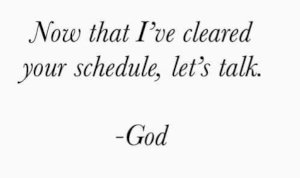 Iran’s Attack on Israel
Iran’s Attack on Israel


6 min read
How to achieve sanity and equilibrium in these times of upheaval and hit the reset button on all the chaos.
This Rosh Hashanah is like no other. Societal structures are shaken from political polarization, racial tension, mental health crisis, extreme weather, and – on top of it all – global pandemic.
Coronavirus is a big wake-up call. With its baffling behavior, we are clearly not in control. Our state of inertia has been disrupted, urging us to reexamine what kind of world that we – both as individuals and as society – seek to build.
The good news is that Rosh Hashanah is a day of zero-based budgeting, when we request "another year of existence" and set our basic potential for that year. The Maharal writes that shana (year) is related to shinui (change). Every year is fundamentally different from the past.
Here are 3 steps to achieve sanity and equilibrium in these times of upheaval; to find our inner voice and hit the reset button on all this chaos.
The first step is to know your enemy. In today’s “attention economy,” the enemy is distraction.
A silver lining to coronavirus is the disruption of Western institutions of entertainment, sports, and travel. In domestic lockdown, there is no running here, no running there, no running anywhere. We spend more time at home with our loved ones, no longer relying on external stimulus or excessive consumption in the vain hope of filling an intangible void.
 Another key element of coronavirus is the isolation, in Hebrew bidud. The reflexive form, l’hit’boded, means “introspection.” Isolation is our window of opportunity to look inside and hear that still, small voice. To reset, recalibrate, and rethink: Where have I been running to? What’s it all about?
Another key element of coronavirus is the isolation, in Hebrew bidud. The reflexive form, l’hit’boded, means “introspection.” Isolation is our window of opportunity to look inside and hear that still, small voice. To reset, recalibrate, and rethink: Where have I been running to? What’s it all about?
Rabbi Moshe Chaim Luzzatto (Mesilat Yesharim – ch. 3) writes that to achieve this state of clarity, all other voices must be silenced. Schedule one hour and disconnect from the grid. Put aside the computer. Power off your phone and put it in another room.
Take a pen and paper. Be totally honest with yourself, with none of the social posturing and spin-doctoring we may be used to on social media. Ask yourself: What would others say I need to improve? How would a trusted friend, family, neighbors or colleagues answer this question?
At age 3, Mondo Duplantis started pole vaulting in his parents' backyard in Louisiana. Ever since, he’s been setting pole vault records, year after year, in his age category. This year, at age 20, Mondo achieved his lifelong dream, setting the world record at 6.18 meters (over 20 feet) – leaping higher than any human before.
The Midrash (Tanchuma – Mishpatim 5:7) says: “When there is judgment from below, there is no need for judgment from Above.” This can be understood that the “judgment” of Rosh Hashanah is not about being put on trial by prosecutors wanting to see you fail. Rather, the goal of this self-judgment is accountability, to ensure that we are producing at – or beyond – our perceived capabilities.
Nobody is perfect. We all make mistakes. The Hebrew word “cheit,” often translated as “sin,” actually refers to a slingshot that missed its target (Judges 20:16). We are expected to be human beings, not angels.
The problem is when we deny responsibility, unwilling to admit the truth to ourselves. This triggers Plan-B: “judgment from Above.” As the prophet Jeremiah (2:35) says: “God will judge us when we say ‘I’ve done nothing wrong’.”
On Rosh Hashanah we stand before God, the Knower of all thoughts, and take full responsibility for our life. On this day we file by, one at a time, like sheep through the pen, in single file. There is no bluffing and no “editing” of reality for some online avatar. There is no blaming and no excuses. Because the bottom line is that nobody will ever take more responsibility for your life than will you.
Beyond good intentions, we’re expected to make an effort that is strategic. The way to do this is to commit to one small step that will make a big difference.
The same way a pole-vaulter plants all the energy at one point in the ground, then uses that to spring upward, so too the key to a successful New Year is to articulate a single sentence that captures your personal mission for 5781:
My destiny is X, and I commit to action Y.
The laws of physics state that a single strategic effort can trigger an enormous chain reaction. For example, one domino can knock down another domino 50% larger than the first. By starting with one regular domino and making each subsequent domino 50% larger, the 11th domino will be the size of a person. With another 16 dominoes you could knock over a 100-story building.
Commit to laser-focus on a single step, that "one big thing" that will have the strongest impact. Then, break that first domino into small, incremental steps. Create a to-do list with one action step every day. Like dripping water, one step after another, you progress toward your grand destination.
This is the call of the hour. In Israel, our first coronavirus nationwide lockdown was on Passover, an eerie reminder of that first Seder night in Egypt when we were commanded “not to leave the house until morning” (Exodus 12:22).
Propitiously, on the eve of this Rosh Hashanah, Israel will begin its second nationwide lockdown. It is a time to reflect, both individually and collectively, on how to secure our future. On Rosh Hashanah, we crown God as King, with the shofar blast heralding the sound of the King's coronation. The shofar, often referred to as “keren” (Joshua 6:5), is the source for the English word k(c)rown, and by extension coronavirus, so named for its resemblance to a crown.
Just as last year’s “judgment” on Rosh Hashanah included the coronavirus, we pray that year’s “judgment” will be for a safe and speedy end to coronavirus. As Rabbi Moses Schreiber, the Chatam Sofer, wrote two centuries ago: 5780 (2020) will be a tumultuous year, followed by a year of great healing and redemption. We pray for the day when the great shofar will once again blow, as Isaiah proclaims (27:13), heralding the ingathering of the exiles, and peace and clarity for all mankind.
